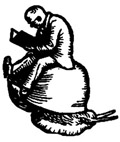|
<< continued from page 1
By drawing together a mix of writers various in background and experience, new depths of awareness and detail can be brought to and incorporated into works brought up for examination. A newcomer or neophyte may raise a question obvious to anyone outside of the literary group, or point out an inaccuracy that cripples the piece for anyone cognizant of the disparity. A piece that was thought to be complete may be shown under a light that reveals significant structural weakness. An ephemeral work by one might inspire something new and more complex from another writer. And beyond the craft of composition, workshops help to create a more integrated and expansive literary community. If the proper mixture between green and seasoned artists cannot be achieved, a small cluster of aspiring writers may work as well, as long as all are committed to the study of the craft. Ideally, workshops contribute to the confidence and skill of artists, create fulfilling and beneficial personal ties, and establish an artistic base for the support and promotion of literature within a larger community. A workshop can draw an artist out of seclusion, and through constructive criticism, the once-isolated writer can gain a new appreciation for and confidence in her own work. But like all tools, collective peer editing can become a crutch. It is possible for an artist to be seduced by the workshop environment. The group should be a community, dedicated to the common pursuit of literary excellence, but may become a society generating text solely for the purpose of self-perpetuation. One might find the pressure of the deadline created by an imminent meeting helpful in urging on the creative processes, but one might also begin producing works solely for the purpose of gratification via immediate response. There is also such a thing as too much editing: like a bonsai tree too closely pruned, a work may suffer excessive evisceration, and die. The same comfortable social environment that makes workshops productive can undermine them, as off-topic utterances and side-conversation distract from and hinder dialogue pertaining to the work at hand. By opening oneself to the experience of the workshop, one can gain valuable insights and even become influenced by the work of others. There is nothing wrong with such influence, but one must be mindful and maintain a conception of one's own principles and purpose. Workshops may be at once a form of rehabilitation from solitude and something one must be prepared to rehabilitate from. The workshop is not the end-all-be-all of tools in the writing process. An artist has many tools, and to hold any up as a favorite is to run the risk of exploiting one virtue to the detriment of others. But the workshop can be an invaluable tool when artists of various backgrounds and levels of ability meet. It can be a place where uncertainties are abolished and new questions are asked; where weaknesses are wrangled with, and strengths brought to the fore. The purpose of the workshop is to focus the knowledge and zeal of individuals into a larger force for the benefit of all those involved. Done well, workshops are not art by democratic vote, but part of the larger creative process around a work. After it has been tested in the fires of open discussion, the work should be remade or let be according to the sensibilities of the artist and her interpretation of the suggestions of others. Ultimately, the workshop strives not to replace individual creative effort, but to enhance it. The writer and the workshop are separate entities working with and against one another: they are complimentary, and the existence of one can contribute dramatically to the enrichment of the other. Milton, Byron and Eliot each needed a hand once in a while; why then should any artist limit his experience and his tools to what he finds immediately before him? |

